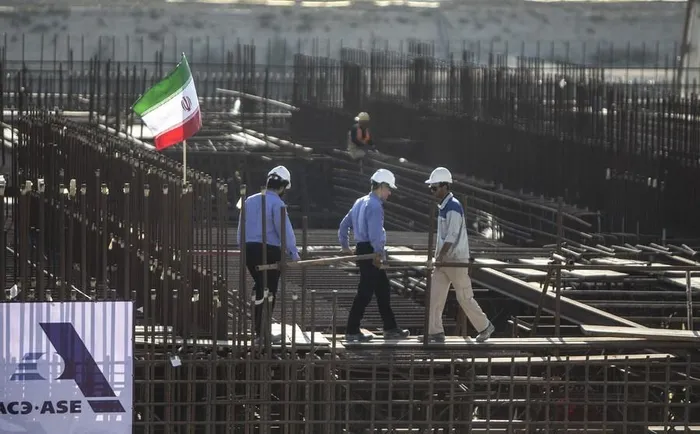
People work at the construction site of the second phase of Iran's Bushehr Nuclear Power Plant in Bushehr, southern Iran, on Nov. 10, 2019. The concrete placement for the construction of the second phase of Iran's Bushehr Nuclear Power Plant started on Sunday.
Image: XINHUA
As international scrutiny intensifies over Tehran’s nuclear activities, Iran is doubling down on its partnership with Russia to advance a new generation of nuclear power projects, even as the threat of renewed United Nations sanctions looms large.
This week, Mohammad Eslami, head of the Atomic Energy OrganiSation of Iran (AEOI), briefed the Iranian Parliament’s National Security and Foreign Policy Commission on the nation’s latest nuclear milestones. Despite extensive damage to nuclear facilities during the recent 12-day Israeli military campaign, Eslami affirmed that operations have not ceased. He underscored that Iran’s radiopharmaceutical production, crucial for medical treatments and exports “has never stopped and will not be halted.”
Between 2022 and 2024, the AEOI has recorded nearly 500 scientific and technological breakthroughs, many of which, Eslami noted, have contributed directly to the economy and the wellbeing of Iranian citizens. These include advances in isotope separation, nuclear medicine, and small-scale power generation, developments Tehran presents as evidence that its nuclear programme remains peaceful and domestically driven.
Central to Iran’s nuclear ambitions is an increasingly strategic alliance with Moscow. Eslami’s recent visit to Russia culminated in a landmark protocol for the construction of eight nuclear power plants, including one operational facility, two currently under construction, and five additional units planned for Hormozgan Province.
Building on this, Tehran and Moscow announced a $25-billion agreement to construct four new Generation III nuclear reactors on a vast 500-hectare site in the southern city of Sirik, directly across the Gulf from Oman and the United Arab Emirates. Once completed, the reactors are expected to generate 5 gigawatts of electricity, substantially easing Iran’s chronic power shortages and providing a domestic alternative to its fossil-fuel-heavy grid.
For Russia’s state nuclear agency, Rosatom, the deal reinforces its position as a major global supplier of atomic energy infrastructure, particularly among non-Western partners. Moscow has publicly opposed Western attempts to reimpose UN sanctions on Iran and has championed diplomacy over isolation, positioning itself as a guarantor of stability in the region’s nuclear energy landscape.
Yet, these developments come at a moment of renewed diplomatic tension. The European “troika”, France, Germany, and the United Kingdom, have initiated the snapback mechanism, a clause of the 2015 Joint Comprehensive Plan of Action (JCPOA) that allows for the automatic reimposition of UN sanctions if Iran is deemed non-compliant with its nuclear commitments.
The United States withdrew from the JCPOA in 2018, reimposing unilateral sanctions, but the mechanism remains active through the UN framework. A China- and Russia-backed resolution currently before the UN Security Council seeks to delay the reactivation of these penalties by at least six months, a move that Western powers have opposed.
Iran’s Parliament, meanwhile, is reportedly drafting a domestic response plan, signalling that Tehran will not yield to Western pressure. Eslami has criticised the International Atomic Energy Agency (IAEA) for what he described as “failing to protect confidential information” and allowing sensitive Iranian data to be exploited politically. He reaffirmed that all diplomatic negotiations remain under the authority of the Foreign Ministry and the Supreme National Security Council, reflecting Tehran’s determination to manage nuclear policy within tightly controlled national channels.
Iran frames its nuclear energy expansion as a matter of sovereignty and self-sufficiency. Decades of sanctions have crippled infrastructure development, constrained investment, and limited access to global energy markets. Nuclear power, according to Iranian officials, offers a sustainable path toward domestic stability, reducing reliance on oil revenues and enhancing grid reliability in a country where blackouts remain common.
However, critics in the West argue that Tehran’s ambitions are not purely civilian. Israel and the United States continue to allege that Iran is edging closer to acquiring weapons-grade capabilities, accusations that Tehran firmly denies. President Masoud Pezeshkian reiterated at the United Nations General Assembly that Iran will “never seek to build a nuclear bomb,” framing the programme instead as a right enshrined under international law for peaceful development.
Still, the optics are complicated. The partnership with Russia, a nation currently under heavy Western sanctions, underscores a broader geopolitical realignment in which sanctioned states collaborate to counter Western dominance. For Iran, this cooperation not only provides technical expertise and funding but also strengthens its leverage in global energy politics.
The confluence of the snapback threat, Israel’s military hostility, and expanding Russian cooperation marks a turning point in Iran’s nuclear trajectory. Rather than retreating under diplomatic pressure, Tehran is signalling defiance, presenting nuclear energy as both a symbol of national resilience and a tool of strategic bargaining.
Whether the UN Security Council grants a temporary reprieve or reinstates sanctions, the trajectory appears clear: Iran intends to deepen its nuclear capabilities and regional partnerships, betting that a multipolar world order will afford it greater room to manoeuvre.
As the standoff over Iran’s nuclear future continues, one fact stands out, the era of unilateral containment is over. From Bushehr to Sirik, the atomic story of Iran is no longer one of isolation, but of recalibrated power in a world still struggling to define the balance between sovereignty, security, and global trust.
Written By:
*Dr Iqbal Survé
Past chairman of the BRICS Business Council and co-chairman of the BRICS Media Forum and the BRNN
*Chloe Maluleke
Associate at BRICS+ Consulting Group
Russian & Middle Eastern Specialist
** MORE ARTICLES ON OUR WEBSITE https://bricscg.com/
** Follow https://x.com/brics_daily on X/Twitter for daily BRICS+ updates
Related Topics: